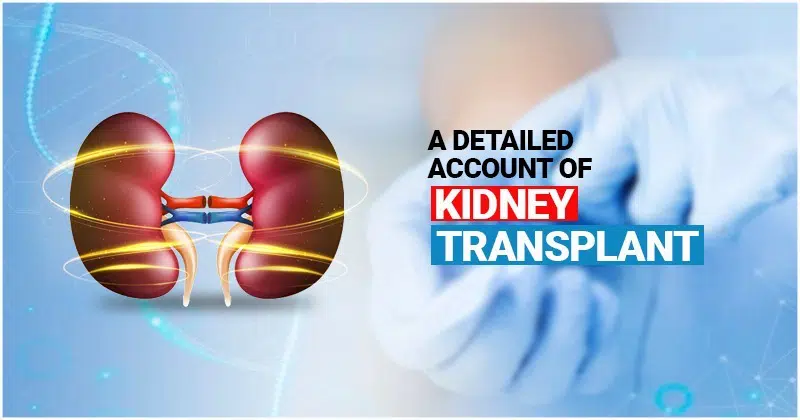A Detailed Account Of Kidney Transplant

The kidneys are two organs located on each side of the spine the main function of which is to filter and remove waste, minerals, and fluid from the blood by producing urine.
What is a Kidney Transplant?
A kidney transplant is a surgical procedure to place a healthy kidney from a living or deceased donor into a person whose kidneys are no longer functioning properly.
When your kidneys lose the filtering ability, harmful levels of fluid and waste accumulate in your body, which can raise your blood pressure and result in kidney failure.
Types and Procedure
A kidney transplant is required if your kidneys have stopped working completely. This condition is also called end-stage renal disease (ESRD) or end-stage kidney disease (ESKD). The doctors recommend regular dialysis or kidney transplant depending upon the patient’s condition. The patient should be healthy enough to have major surgery and maintain a lifelong medication regimen after the surgery. In case of an underlying medical condition, like cancer, tuberculosis, etc. a kidney transplant might be risky. However, in many cases where patients who are older or have other health conditions like diabetes can still have successful kidney transplants. A comprehensive evaluation is required.
The Types of Kidney Transplants include Deceased-donor kidney transplant, Living-donor kidney transplant, Preemptive kidney transplant.
The evaluation process may take several days and includes a thorough physical exam, imaging studies, such as X-ray, MRI or CT scans, Blood tests, and psychological evaluation.
When the patient is evaluated for a transplant, blood tests are done to determine the blood type (A, B, AB, or O) and the human leukocyte antigen (HLA). HLA is a group of antigens located on the surface of the white blood cells which are responsible for immunity.
If the patient’s HLA-type matches the donor’s HLA-type, it’s more likely that the transplanted kidney will not be rejected. However, another test is required to make sure that the patient’s antibodies won’t attack the donor’s blood. This is done by mixing a small amount of the patient’s blood with the donor’s blood. The transplant can’t be done if your blood forms antibodies in response to the donor’s blood. If the blood shows no antibody reaction, the patient has what’s called a “negative crossmatch.” This means that the transplant can proceed.
If a compatible living donor isn’t available, your name shall be placed on a kidney transplant waiting list to receive a kidney from a deceased donor.
Kidney transplants are performed with general anesthesia. The surgical team monitors the heart rate, blood pressure, and blood oxygen level throughout the procedure. The surgeon makes an incision in the lower part of one-side-of-the-abdomen and places the replacement kidney into the body. The blood vessels of the replacement kidney are attached to blood vessels in the abdomen. The replacement kidney’s ureter which is a tube that links the kidney to the bladder is connected to the bladder.
Recovery
After the kidney transplant, you will need to spend several days in the hospital recovery area under observation. After a successful kidney transplant, the new kidney will start filtering your blood. Usually, this starts immediately or may take several days and the patient may need temporary dialysis till the new kidneys begin to function properly.
Risks and Post Transplant Care
Kidney Transplant carries several risks including blood clots and bleeding, leaking from or blockage of the tube (ureter), Infection, Failure or rejection of the donated kidney, an infection or cancer that can be transmitted with the donated kidney, or even death, heart attack and stroke, anti-rejection and medication side effects. The medications can cause a variety of side effects, including Bone-thinning, bone damage, diabetes, excessive hair growth or hair loss, high blood pressure, high cholesterol, etc.
After the kidney transplant, frequent checkups are needed to ensure recovery. Close monitoring is necessary for a few weeks to check the functioning of the new kidney
For lifelong you will need to take the medications as prescribed, follow the diet and exercise guidelines, quit smoking, staying involved in healthy activities. A nutrition-rich diet needs to be maintained with healthy food options like eating at least five servings of fruits and vegetables each day, having enough fiber-rich diet, drinking low-fat milk or eating other low-fat dairy products, eating lean meats, poultry and fish. Staying hydrated, practicing mild exercise, and physical activity should be a regular part of your life.
Life significantly shortens if your kidneys don’t function properly. PSRI is one of the best kidney transplant hospitals in Delhi where our experts provide the best treatment to the patients. With the help of our team of highly skilled doctors, trained nurses, and hospital staff we are the best hospital for kidney transplants in Delhi-NCR.Book an appointment to avoid the possibility of kidney problems.

 Book An Appointment
Book An Appointment Virtual Consultation
Virtual Consultation





